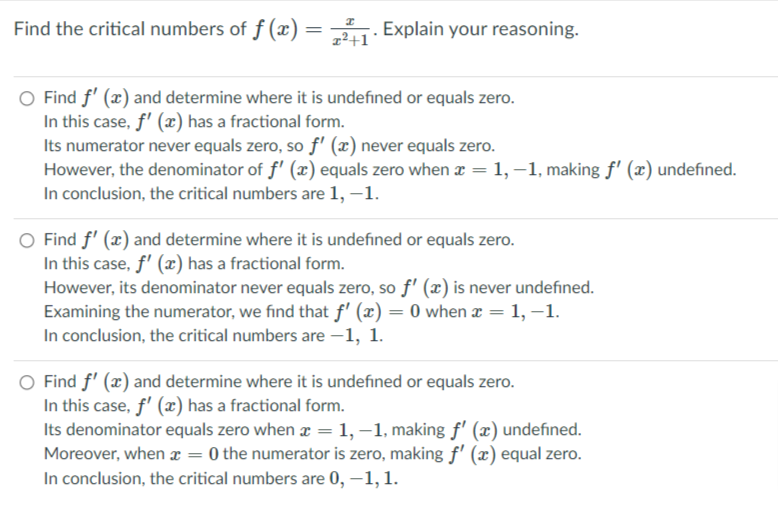Find the critical numbers of f (x)= . Explain your reasoning. Find f' (x) and determine where it is undefined or equals zero. In this case, f' (x) has a fractional form.
Find the critical numbers of f (x)= . Explain your reasoning. Find f' (x) and determine where it is undefined or equals zero. In this case, f' (x) has a fractional form.
Functions and Change: A Modeling Approach to College Algebra (MindTap Course List)
6th Edition
ISBN:9781337111348
Author:Bruce Crauder, Benny Evans, Alan Noell
Publisher:Bruce Crauder, Benny Evans, Alan Noell
ChapterA: Appendix
SectionA.2: Geometric Constructions
Problem 10P: A soda can has a volume of 25 cubic inches. Let x denote its radius and h its height, both in...
Related questions
Topic Video
Question
100%
Solve for Precalculus easy, I will rate and like. Thank you for your work!
NOT GRADED.

Transcribed Image Text:Find the critical numbers of f (x) = . Explain your reasoning.
z²+1
O Find f' (x) and determine where it is undefined or equals zero.
In this case, f' (x) has a fractional form.
Its numerator never equals zero, so f' (x) never equals zero.
However, the denominator of f' (x) equals zero when a = 1, –1, making f' (x) undefined.
In conclusion, the critical numbers are 1, –1.
O Find f' (x) and determine where it is undefined or equals zero.
In this case, f' (x) has a fractional form.
However, its denominator never equals zero, so f' (x) is never undefined.
Examining the numerator, we find that f' (x) = 0 when æ = 1, –1.
In conclusion, the critical numbers are –1, 1.
Find f' (x) and determine where it is undefined or equals zero.
In this case, f' (x) has a fractional form.
Its denominator equals zero when x =1,–1, making f' (x) undefined.
Moreover, when = 0 the numerator is zero, making f' (x) equal zero.
In conclusion, the critical numbers are 0, –1, 1.
Expert Solution
This question has been solved!
Explore an expertly crafted, step-by-step solution for a thorough understanding of key concepts.
This is a popular solution!
Trending now
This is a popular solution!
Step by step
Solved in 2 steps

Knowledge Booster
Learn more about
Need a deep-dive on the concept behind this application? Look no further. Learn more about this topic, calculus and related others by exploring similar questions and additional content below.Recommended textbooks for you

Functions and Change: A Modeling Approach to Coll…
Algebra
ISBN:
9781337111348
Author:
Bruce Crauder, Benny Evans, Alan Noell
Publisher:
Cengage Learning

Trigonometry (MindTap Course List)
Trigonometry
ISBN:
9781337278461
Author:
Ron Larson
Publisher:
Cengage Learning

Functions and Change: A Modeling Approach to Coll…
Algebra
ISBN:
9781337111348
Author:
Bruce Crauder, Benny Evans, Alan Noell
Publisher:
Cengage Learning

Trigonometry (MindTap Course List)
Trigonometry
ISBN:
9781337278461
Author:
Ron Larson
Publisher:
Cengage Learning